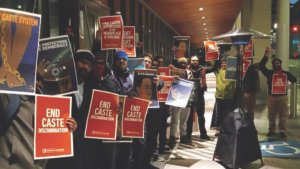![]()
The Seattle City Council’s anti-caste legislation has been widely hailed as a significant move toward making the South Asian community abroad more egalitarian. But it’s the opposition from the ‘upper’ caste Hindus in the US and in India that we need to focus on to understand how and why a law banning discrimination can anger a section of society.Since even Hindu organisations in the US have not used the oft-mentioned arguments in defence of caste system — “it’s nothing but another name for division of labour”; “Hindus practice Guna (??? or quality)-based Varna and not birth-based Caste” — I will limit my arguments to the points raised in the three letters (1, 2, 3) they have written to the Seattle City Council.
As the law kicks off the caste debate in the US, we will likely keep hearing these four claims and arguments:1. Most Hindus in the United States are unaware of or even recognise or show their caste. Seattle city won’t be able to enforce any ban on caste discrimination because there is no known method to determine the caste of a South Asian person.
2. Anti-caste law is discriminatory because it applies only to South Asians and some Asian and African immigrant communities.
3. Caste is one of the most complicated and misunderstood concepts related to India and Hinduism.
4. There is no religion in South Asia that officially sanctions such discrimination.
Busting the arguments
The first argument claims that the Hindu diaspora is casteless or caste-blind, so why enact any law to stop caste-based discrimination. This is a fallacious argument. Not recognising caste does not obliterate the privileges and the capacity to discriminate based on caste. For most Indians, knowing about their own caste and how to place themselves in the caste matrix is part of their primary socialisation. A large survey by Pew Research has revealed that “Indians conduct their social lives largely within caste hierarchies.” Castes and caste-networks are so entrenched and meticulously framed that identifying someone from one’s own caste group is like knowing the back of their own hand. It’s said that Indians carry their pickle, Gangajal, and caste wherever they go. Dr B.R. Ambedkar once wrote that “if Hindus migrate to other regions on earth, Indian caste would become a world problem.” This is what we are actually witnessing. Even in the US, various caste groups have formed their caste associations, and this is how they conduct their social life. Identifying caste for legal purposes can be a problem, but the anti-caste law is not about identifying someone’s caste. If someone proves that they have been discriminated against on the basis of caste, then this provision of the law applies. This law is not caste-specific, and implies that a person belonging to any caste can be held guilty of discrimination. 






